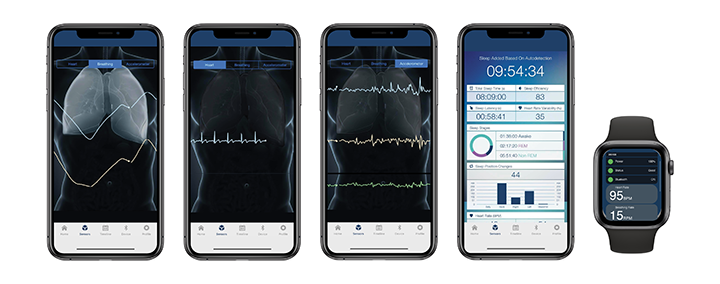The “smart shirts” helping reduce the pressure COVID-19 is putting on hospitals

Hexoskin’s high-tech shirts monitor vital signs at home, freeing up valuable space and time for health-care workers on the pandemic’s frontlines.
As the coronavirus disease (COVID-19) swept across the world in February, Pierre-Alexandre Fournier and his colleagues at Hexoskin began looking for ways to help.
The Montréal-based maker of smart shirts, which are enhanced with high-tech health sensors, quickly offered its services to health authorities in Canada and the United States.

“Our specialty is monitoring vital signs at home, and we wanted to help reduce the burden on the hospital system,” Fournier says. “We thought that what we might be able to do is to help keep more patients at home.”
By the end of March, Hexoskin was installing patient-monitoring programs at hospitals in Canada, the United Kingdom and the United States, having made COVID-19-related work its top priority.
The company is also setting up telehealth teams of its own to support its programs, a move that complements health systems’ resources rather than adding an extra burden to them.
Hexoskin is now getting interest for its COVID-19 monitoring solution from other parts of the world, including Australia, Italy and Japan.
Hexoskin has been making its smart shirts since 2013. Each is equipped with built-in sensors that capture physiological details, such as respiratory and cardiac activity, blood pressure and skin temperature.
The shirts, which are made from machine-washable Italian fabric, have Bluetooth connectivity to most smartphones and tablets.
Proprietary software analyzes the data and transmits it to servers in the cloud, either for the wearer’s own use, or for research into, for example, sleep and behaviour patterns and the effect of ageing on physical performance.
Fournier sees a special benefit for conditions such as chronic cardiac and respiratory diseases, as well as post-traumatic stress disorder, which need to be monitored over an extended period.
“Most health-care needs are related to chronic diseases and ageing,” he says. “But hospitals are not made for those conditions. People should not be going to emergency rooms for diabetes or cardiac-disease management. You need to take care of these every single day of the year.”
Fournier, who has a background in electrical engineering and machine learning, has dedicated most of his career to health-care and technology development.

He and co-founder Jean-François Roy, who is also the chief technical officer, are Hexoskin’s main shareholders, together with about 30 investors from Anges Québec, a network of more than 200 private investors looking for opportunities in high-potential start-ups.
Exports make up the bulk of Hexoskin’s sales, with the United States by far its biggest market. Its main customers there have been the research arms of government agencies, such as the U.S. Navy, the Department of Homeland Security and NASA, as well as universities and pharmaceutical companies.
Hexoskin has also formed a partnership with FC Barcelona, one of Spain’s top soccer teams, to study how sleep affects young athletes’ performance. A climber on Mount Everest wore a Hexoskin shirt to monitor how the body performs with a diminished oxygen supply. Meanwhile, defence departments in Australia, Canada, New Zealand and the United States have ordered Hexoskin garments.
The Canadian Trade Commissioner Service has played a valuable role in the company’s growth, mainly by helping set up meetings with local contacts.
“It’s easier for us to understand business in Paris or London than in Tokyo,” Fournier says, citing the support he received ahead of a conference in Japan. “I’d recommend the trade commissioners for any early-stage company working to enter a market outside Canada. They can help you make the contacts in your industry.”
Hexoskin is also an alumnus of the Trade Commissioner Service’s Canadian Technology Accelerator program. The program provides high-potential technology firms with tailored support for export efforts in North America, Europe and Asia, including coaching, market validation and introductions to prospective investors, partners and clients.
Fournier says his proudest moment came in December 2018 when he and his colleagues watched a SpaceX Dragon cargo rocket lift off from Cape Canaveral carrying a Hexoskin monitoring system for astronauts aboard the International Space Station.
“We were all thinking that we made something on that rocket that was very special,” he says.
But Fournier knows that the work Hexoskin is doing on COVID-19 is just as important.
“We feel privileged to be working for health-care workers who are at the front line of this pandemic,” he says. “Our team believes that in these challenging times, we can really make a difference. We feel like we’re helping write history.”.
- Date modified: